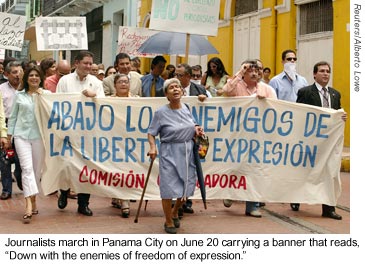New York, June 23, 2006—The Committee to Protect Journalists is alarmed by a proposal sent to Panama’s President Martín Torrijos to stiffen penalties for defamation, including a doubling of prison terms.
A commission of lawyers and academics, which was set up by Torrijos to examine penal code reform, made the proposals in a draft bill last week, Jean Marcel Chéry, a reporter for the Panama City based daily La Prensa, told CPJ. If Torrijos and his cabinet endorse the draft, it will be put before the legislature in September. Among the amendments, Article 214 would drastically increase penalties and raise the maximum prison term for defamation to three years.
“These proposals are outrageous,” said CPJ Executive Director Ann Cooper. “Panama should be decriminalizing defamation laws not doubling jail time for journalists. We urge President Torrijos not only to reject these recommendations but to eliminate criminal sanctions for defamation altogether.”
More than 50 journalists demonstrated in Panama City on June 20 against the proposals which they called a “gag law.” Presidential secretary Ubaldino Real agreed to include journalists in a new commission that would examine the proposals, The Associated Press reported. Chéry, one of the six journalists who will sit on the commission, said all six rejected the proposed reforms.
There is a growing consensus among international bodies that civil remedies provide adequate redress for press offenses. In late April, Mexico City’s Legislative Assembly passed a bill that effectively eliminated libel and slander from Mexico City’s penal code, directing such complaints to the civil courts.
In September 2004, the Inter-American Court ruled in the case of Paraguayan politician Ricardo Canese that his criminal defamation conviction violated international law. The court declared that the criminal proceedings themselves violated the American Convention on Human Rights because they were not “necessary in a democratic society.”
“The lawyers and academics serving on the panel are out of touch with trends in international law,” Cooper added.
